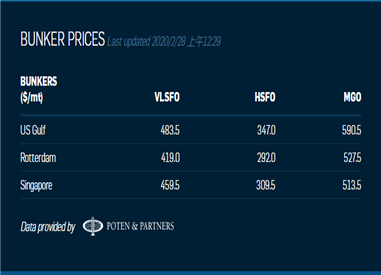 Pacific Basin Shipping profit shrinks but fleet growth will continue
Pacific Basin Shipping profit shrinks but fleet growth will continue
Hong Kong-based outfit says it remains focused on growing its owned fleet of handysize and supramax bulkers
Pacific Basin saw a fall in net profit last year but said it will continue to focus on its strategy of buying new ships where it can and reducing its chartered-in fleet.
The Hong Kong-based company, which owns and operates a fleet of handysize and supramax bulk carriers, posted net profit of $25.1m for the full year 2019.
The result is a 65% reduction compared to its net result of $72.3m for 2018.
"Our results benefited from our TCE [time-charter equivalent] earnings outperformance, enlarged owned fleet and competitive cost structure," Pacific Basin's chief executive Mats Berglund said in the company's year-end report for 2019.
"But [the results] were adversely affected by weaker dry bulk market conditions and more off-hire than normal, especially in the second half of the year, due to scrubber installations and a record number of dry-dockings."
The firm's average handysize and supramax net daily TCE earnings were down by 4% year on year, but still managed to outperform the Baltic indices, Pacific Basin said.
Its handys earned an average TCE of $9,630 during 2019, outperforming the Baltic Handysize Index by 41%.
Meanwhile, its supramaxes beat the Baltic Supramax Index by 24% with average TCE earnings of $11,720 per day.
By tweaking its financial arrangements last year, Pacific Basin was able to improve its available liquidity by $41.1m to $382.8m, compared to the end of 2018.
Pacific Basin's board has recommended a dividend of HKD 2.1 cents ($0.003) per share, which is down from the HKD 6.2 cents paid out to shareholders for 2018.
Fleet development
Pacific Basin has reduced the number of vessels it has on long-term charter from 61 at the end of 2012 to around 18 on average for 2020.
The vessels are being replaced with owned ships and chartered-in ships on contracts of up to 12 months, it said.
"We will continue to pursue our fleet growth and renewal strategy," the company said in its report.
"Over the long term, we see upside in secondhand values and our buying focus remains on secondhand Japanese-built ships for their good quality and value."
The firm said it will not order newbuildings due to their high price, low return and uncertainty over how new environmental regulations will impact future vessel designs and technology.
Pacific Basin took delivery of eight secondhand vessels last year, comprising six supramax and two handysize bulk carriers. It also sold two older smaller handysize vessels.
The company expects its owned fleet to number 117 ships by the end of April 2020.
Two more supramaxes and one handysize bulker are scheduled to join its fleet and another handy that has been sold will be delivered to its buyer by the end of that month.
Outlook
Berglund said the coronavirus has compounded and prolonged the seasonal Chinese New Year dip in shipping demand and has disrupted logistics, but expects this to pass.
"Catch-up demand and stimulus should trigger a rebound once the virus is under control and Chinese activity returns," he wrote in the report.
"Hence, this year will likely be characterised by initial challenges and continued volatility."
Pacific Basin has covered 42% and 60% of its handysize and supramax vessel days for 2020 at $8,910 and $11,390 per day net respectively.
The company said it expects that demand for dry cargo shipping should be supported this year by a normalisation of cargo supply fundamentals as well as from fleet inefficiencies.
"Many larger ships will continue to be taken out of service for scrubber retrofits, and the majority of the world’s dry bulk vessels (especially in our segments) will increasingly sail at reduced optimal operating speeds – as has already been evident early in the year – due to the higher price of low-sulphur fuel," Pacific Basin said in its report.
"This will mitigate effective supply growth in 2020 and beyond, and uncertainty over new environmental regulations and the gap between newbuilding and secondhand prices should discourage new ship ordering."
Today's Bunker Prices:




